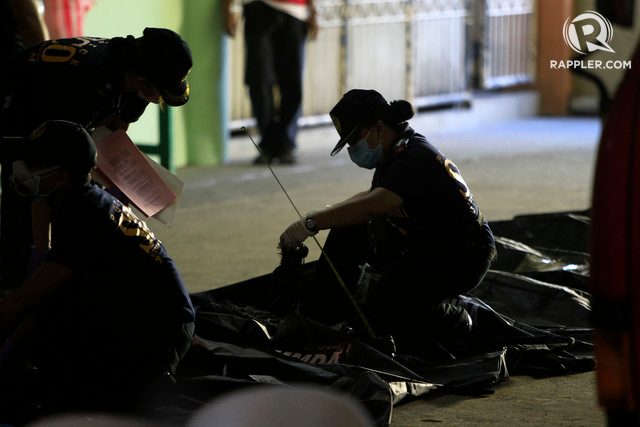SUMMARY
This is AI generated summarization, which may have errors. For context, always refer to the full article.

MANILA, Philippines – President Benigno Aquino III would rather let Congress do its job without his prodding.
Brandishing lawmakers as “sensitive” when it comes to receiving instructions from him, Aquino brushed off calls to certify as urgent pending pro-worker legislations, including criminalizing grave violations of occupational safety and health (OSH) standards.
Aquino was pressed to answer what his stand on the matter is in a press conference Monday, June 1.
Sought by Aquino for comment during the briefing, Labor Secretary Rosalinda Baldoz also said that the labor committees of the two chambers of Congress are already prioritizing the OSH bill on the heels of the deadly industrial fire last May 13.
Citing Baldoz’ explanation, Aquino added there is already an impetus from members of Congress themselves.
The President said there are enough laws to ensure workers’ welfare in the Philippines, and that the problem lies in proper enforcement.
Aquino cited as an enforcement problem the Valenzuela City government’s issuance of a provisional business permit to embattled slipper maker Kentex Manufacturing, despite the lack of a fire safety inspection certificate – a clear breach of the Philippine Fire Code.
A massive blaze gutted Kentex’s two-story factory in Valenzuela, killing at least 72 workers trapped inside and injuring others who were able to escape the 5-hour inferno.
Aquino said the factory engulfed by the fire did not have a fire detection and alarm system and a protected fire exit. Around 23 more establishments in the area of Kentex failed to pass basic fire safety rules, he added.
Even without the proposed measure imposing criminal penalties on grave OSH violations, Aquino explained that a criminal case of reckless imprudence resulting to multiple homicide can be lodged against the Kentex owners.
Baldoz and labor groups had renewed their call to amend the 4-decades-old Labor Code, which merely fines OSH violations.
Baldoz explained that there are already existing laws that prohibit underpayment of workers and the use of non-capitalized entities as job contractors, which Kentex would have to be accountable for.
The Kentex fire is seen as a setback for the Philippine manufacturing industry, even as it sheds light on the need for strict enforcement of workplace regulations.
Monday’s press conference focused on Aquino’s directives in the aftermath of the country’s largest industrial accident in recent decades.
Security of Tenure bill
During the press conference, Aquino glossed over a question about his stand on contractual labor.
Former Akbayan Party-list Representative and labor rights advocate Walden Bello had been very vocal about Aquino’s alleged earlier refusal to certify as urgent his Security of Tenure bill.
The bill seeks to limit contractual labor to 30% in all establishments operating for more than a year with 10 or more employees. Under the bill, job contracting will apply only for positions not necessary and desirable in the day-to-day operations of the company.
Job contracting and subcontracting are an alternative hiring arrangement where workers are outsourced from manpower agencies and the like.
If the subcontractor is not capitalized, it is a mere dummy or a labor-only contractor, which is prohibited by law. This irregular practice is used by unscrupulous employers to deny an employer-employee relationship with workers and consequently evade law-mandated benefits.
In the case of Kentex, its listed subcontractor, CJC Manpower Services, was unregistered with both the Department of Labor and Employment (DOLE) and the Securities and Exchange Commission.
Baldoz had explained that CJC was a mere dummy of Kentex, with its owner a mere 19-year-old student.
Kentex owes at least P7.8 million in unpaid wages to 99 of its 210 factory workers. The 99 were listed as CJC employees.
Lawyer Renato Paraiso, representing two of Kentex’s owners, denied any standing relationship other than a business-related one between the CJC owner and his clients.
Job contracting and subcontracting are presently subject to regulation under DOLE Department Order (DO) 18-A, which makes both the principal company and its contractor jointly and solidarily liable for any violations of workers’ rights.
Under DO 18-A, contracted workers are entitled to a host of benefits as provided in the Labor Code, including state health insurance under PhilHealth, social insurance under the Social Security System, 13th month pay, and the like.
Marlou Agunos, wife of late Kentex worker Joanna, said his wife had not been given any of these benefits despite her 8 years of work with Kentex.
DO 18-A was issued by Baldoz after a stalemate in talks at the tripartite level, given extremely polar views from the employer and labor sector.
The former argued that contractual labor is needed to enable businesses to easily outsource workers for seasonal jobs, while some labor groups called for an absolute ban of contractualization.
Groups from the far left have criticized Bello’s bill as an unacceptable compromise for workers, even calling for the criminalization of contractual labor.
A known Aquino critic, Bello had repeatedly hit the President for alleged pro-business policies that put the working class at a disadvantage.
Criminal cases
Kentex’s alleged violations will soon enter the preliminary investigation stage, where the prosecutorial arm of government will determine if there is probable cause to file charges in court against those seen liable for the fire.
Aquino has, so far, merely cited Kentex and the Valenzuela local government.
The handling prosecutor for the case is given 60 days to complete the preliminary probe.
Baldoz earlier said Kentex may face criminal liability, depending on the result of state investigations.
These criminal cases may include reckless imprudence resulting to multiple injury and multiple homicide, violation of the Fire Code, violation of the National Building Code, arson, criminal liability under Article 288 of the Labor Code for possible violation of labor standards, occupational safety and health standards, and social legislations. – Rappler.com
Add a comment
How does this make you feel?
There are no comments yet. Add your comment to start the conversation.